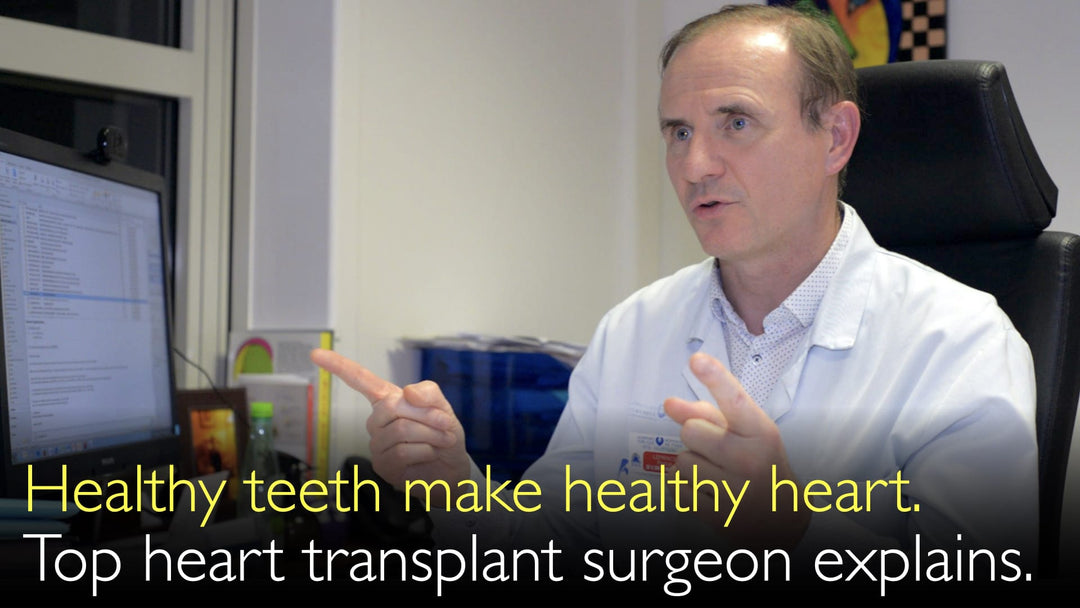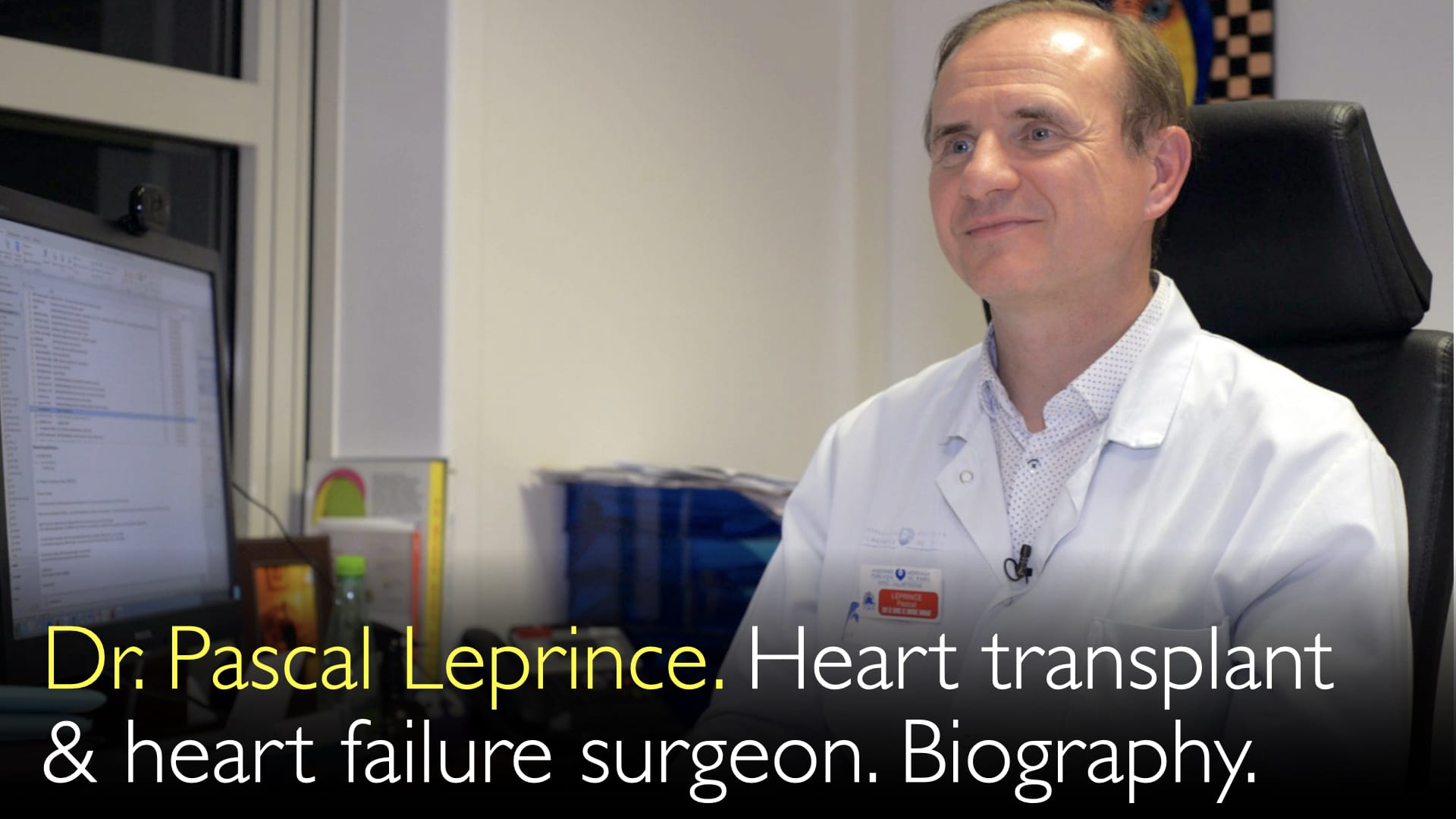Dr. Pascal Leprince, MD, en førende ekspert inden for hjerte transplantation, forklarer den afgørende sammenhæng mellem oralhygiejne og hjerteinsufficiens. Han påpeger, at dårlig tandpleje kan medføre alvorlige infektioner som endokarditis, som ofte nødvendiggør kompleks hjertekirurgi eller endda en hjerte transplantation. Dr. Leprince argumenterer for styrkede folkesundhedspolitikker, herunder tilskud til tandpleje, og fremhæver, at enkle daglige vaner som fysisk aktivitet og bevidst spiseadfærd er effektive og økonomiske værktøjer til at forebygge fremskreden hjertesygdom.
Den kritiske forbindelse mellem tandinfektioner og forebyggelse af hjerteinsufficiens
Spring til afsnit
- Hvordan tandinfektioner forårsager endokarditis
- Forebyggelse af hjerte transplantation gennem tandpleje
- De offentlige sundheds- og økonomiske omkostninger
- Enkle daglige vaner for hjerte sundhed
- Behovet for forbedrede tand sundhedspolitikker
- Fuld transskription
Hvordan tandinfektioner forårsager endokarditis
Dr. Pascal Leprince, en førende hjerte transplantationskirurg, forklarer sammenhængen klart: Tandinfektioner er en primær kilde til bakterier, der kan spredes via blodbanen og fæstne sig til hjerteklapper. Dette kan udvikle sig til en alvorlig infektion kendt som infektiv endokarditis.
Endokarditis medfører ofte varig skade på hjertets klapper og strukturer, hvilket kan føre til alvorlig hjerteinsufficiens. I interviewet med Dr. Anton Titov fremhæves det, hvordan et tilsyneladende uafhængigt problem i munden direkte kan udløse en livstruende hjerte lidelse.
Forebyggelse af hjerte transplantation gennem tandpleje
En påfaldende statistik fra Dr. Pascal Leprince understreger forebyggelsens betydning: 25–30% af hjerte transplantationer på grund af alvorlig hjerteinsufficiens kunne undgås ved bedre efterlevelse af kendte behandlinger, herunder god tandhygiejne.
Dette viser et stort potentiale for at redde liv og mindske presset på transplantationssystemet. Ifølge Dr. Leprince er renholdelse af tænder og forebyggelse af infektioner ikke kun et spørgsmål om mundsundhed, men en direkte strategi for at undgå behovet for hjerte transplantation.
De offentlige sundheds- og økonomiske omkostninger
De økonomiske konsekvenser er betydelige. Dr. Pascal Leprince påpeger, at omkostningerne ved hjerte transplantation er enorme. Han nævner også et specifikt problem i Frankrig, hvor tandpleje kun delvist refunderes, hvilket skaber en økonomisk barriere for patienter.
Denne adgangsbarriere fører til en ond cirkel: Patienter undgår tandlægen på grund af omkostningerne, udvikler alvorlige infektioner og ender med at kræve dyr hjertekirurgi for endokarditis. Både Dr. Titov og Dr. Leprince er enige om, at forebyggelse er langt mere omkostningseffektiv end behandling.
Enkle daglige vaner for hjerte sundhed
Ud over tandpleje anbefaler Dr. Pascal Leprince en helhedsorienteret, men overskuelig tilgang til forebyggelse. Han opfordrer til daglig motion som f.eks. gåture og bevidsthed om kostvaner.
Ifølge ham behøver man ikke at være hyperfokuseret på det hele tiden. Disse simple, daglige vaner er gavnlige for både krop og sind. Rådene fra en erfaren kirurg gør hjerte sundhed til et opnåeligt mål for de fleste.
Behovet for forbedrede tand sundhedspolitikker
Samtalen mellem Dr. Anton Titov og Dr. Pascal Leprince slutter med en opfordring til handling. Dr. Leprince mener, at opmærksomheden på tand sundhed skal forbedres i mange lande. Bedre refusionsordninger kan fjerne økonomiske barrierer og give flere adgang til nødvendig tandpleje.
Forbedret offentlig oplysning er også afgørende. De fleste forbinder ikke tandpleje med hjerte sundhed, men som Dr. Leprince forklarer, er de tæt forbundne. At mindske denne videnkløft er afgørende for at forebygge utallige tilfælde af endokarditis og hjerteinsufficiens.
Fuld transskription
Dr. Anton Titov: Det er en meget vigtig pointe. Du siger, at 25–30% af hjerte transplantationer på grund af alvorlig hjerteinsufficiens kunne forebygges ved bedre overholdelse af kendte behandlinger. Det har enorme sundhedsmæssige konsekvenser, især når man tænker på, at der ikke er uendeligt med hjerter til transplantation. Omkostningerne er også enorme.
Jeg synes, det er altafgørende. Det samme gælder for endokarditis. Mange tilfælde af hjerteklapsendokarditis skyldes tandinfektioner. I Frankrig refunderes tandpleje kun delvist, så nogle patienter undgår tandlægen af økonomiske årsager. Det fører til alvorlige tandproblemer.
Disse tandinfektioner kan udvikle sig til endokarditis, som igen kan kræve hjertekirurgi – alt sammen på grund af dårlig tandhygiejne. Det er virkelig vigtigt!
Lad os høre fra en førende hjerte transplantationskirurg: Hvor vigtig er det at holde tænderne fri for infektion? Fordi tandinfektioner kan føre til infektion på hjerteklapperne, altså endokarditis, som igen kan medføre hjerteinsufficiens og behov for transplantation.
Pas på dine tænder, før dit hjerte svigter. Pas på dig selv generelt – få daglig motion, vær opmærksom på kosten. Du behøver ikke at være ekstremt fokuseret på det hele tiden. Jeg tænker ikke konstant på min livsstil, men jeg sørger for at bevæge mig hver dag.
Dr. Pascal Leprince: Vi ved, at det er godt for kroppen, sindet og generel sundhed. Og det behøver ikke at koste meget.
Dr. Anton Titov: Man kan bare gå en tur. De fleste patienter forbinder ikke tandpleje med hjerte sundhed, men de hænger direkte sammen, som du netop nævnte.
Dr. Pascal Leprince: Ja! Vi er nødt til at skabe større bevidsthed om tand sundhed i vores lande.





